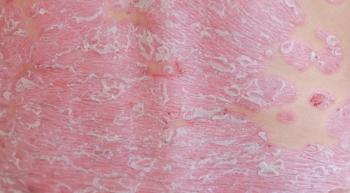
Skin Cancer
Latest News
Latest Videos

More News

With the identification of actionable alterations, precision medicine continues to lead the way in all areas of oncology, but especially in melanoma, according to Jason J. Luke, MD, FACP, who added that, in order to successfully apply personalized therapy, it’s critical to be fluent in the differences between biomarkers.

Tebentafusp (IMCgp100) showed superiority in overall survival (OS) compared with investigator’s choice of therapy in patients with previously untreated metastatic uveal melanoma, according to results of a preplanned interim analysis of the phase 3 IMCgp100-202 trial (NCT03070392).

Cemiplimab (Libtayo) demonstrated clinically meaningful antitumor activity, including durable responses, and acceptable safety in patients with metastatic basal cell carcinoma (mBCC) after progression on or intolerance to hedgehog inhibitors.

In an effort to further improve outcomes without sacrificing tolerability, the combination of cabozantinib (Cabometyx) with pembrolizumab (Keytruda) is being evaluated in patients with advanced melanoma in a phase 1b/2 study (NCT03957551), according to a virtual presentation during the 2020 SITC Annual Meeting.

Subgroup analyses from the phase III CheckMate-067 trial identified potential biomarkers in patients who achieved a complete response (CR) with the combination of nivolumab (Opdivo) and ipilimumab (Yervoy) but later progressed, according to Georgina V. Long, BSc, PhD, MBBS, FRACP.1 Now, investigators are working to answer more questions about this group of patients.

There is still a great deal to learn about the optimal use of BRAF-targeted therapy, as well as immunotherapy, in the adjuvant setting for patients with melanoma.

There has been exciting progress for the treatment of melanoma in recent years, but there is still more work to be done.

Despite the recent advancements with BRAF-targeted therapies and PD-1 checkpoint inhibitors, there is still much to learn in the field of melanoma, especially with regard to disease biology, according to Jason J. Luke, MD, FACP, who added that this understanding is needed to inform development and sequencing strategies, as emphasized during the 2020 SMR Virtual Congress.

The addition of anti–PD-1/PD-L1 to combination BRAF and MEK inhibition has been shown to improve progression-free survival and duration of response in patients with BRAF-mutated melanoma.

The COVID-19 pandemic can affect every stage of the cancer experience: from diagnosis to adverse event management.

Despite many exciting advances in recent years, there are still aspects of melanoma treatment that need to be further studied and understood, said Grace Cherry, NP, a nurse practitioner at UCLA Health.

“Nurses are our frontline as far as giving these treatments and also in teaching our patients about side effects and detecting them,” Grace Cherry, NP, MSN, RN said.

As immunotherapy continues to move into different tumor types, nurses must familiarize themselves – and their patients – with immune-related adverse events.

The FDA approved atezolizumab plus cobimetinib and vemurafenib for the treatment of patients with BRAF V600 mutation-positive advanced melanoma.

During his presentation, Michael A. Postow, MD, briefly reviewed the latest updates with immunotherapy and other targeted treatments in melanoma reported during the 2020 ASCO Virtual Scientific Program.

Nivolumab plus ipilimumab showed an improvement in relapse-free survival for this patient population.

Efforts are being made to address remaining questions in the realm of BRAF-mutant melanoma, according to Charles L. Sawyers, MD.

Five-year findings from the phase 3 COMBI-AD trial revealed that the combination of dabrafenib (Tafinlar) and trametinib (Mekinist) led to sustained long-term relapse-free survival (RFS) benefit compared with placebo for patients with resected, stage III BRAF V600E/K–mutant melanoma, said Axel Hauschild, MD, PhD.

The FDA has granted an accelerated approval to an updated dosing schedule for pembrolizumab (Keytruda) to include an every-6-weeks option at 400 mg across all indications in adult patients.

Although the emergence of more targeted and immunotherapies continues to expand the melanoma treatment paradigm, surgery remains an important tool in the management of these patients, according to Omid Hamid, MD.

T-cell therapies, such as tumor-infiltrating lymphocyte (TIL) therapy, T-cell receptor (TCR) therapy, and CAR T-cell therapy, which have shown preliminary signals of activity, are poised to have a dramatic impact in metastatic melanoma, according to Jason J. Luke, MD, FACP.

The role of radical surgical resection in advanced melanoma has become more conservative and cosmetically sensitive, according to Richard L. Shapiro, MD.

Optimal management of treatment-related dermatologic adverse events (AEs) in patients with melanoma is essential for proper care, according to Tracey Liebman, MD.

Do a head-to-toe scan when discussing adverse events for melanoma treatment, says a nurse practitioner.

Being able to quickly detect and properly manage adverse events (AEs) that arise in patients with melanoma who are receiving immunotherapy is key to improving their experience with treatment, explained Kathleen Madden, RN, MSN, FNP-BC, AOCNP®, APHN.










































